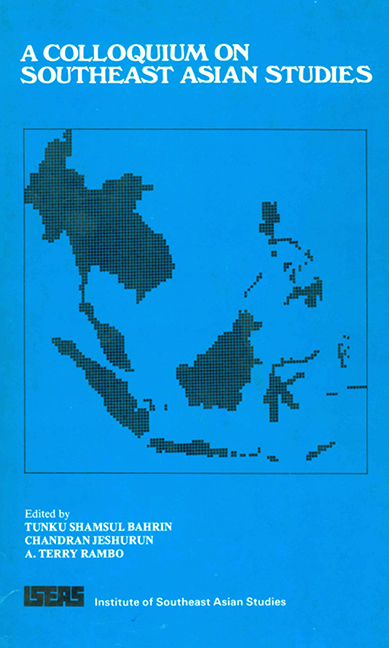Book contents
- Frontmatter
- Contents
- Foreword
- Preface
- Acknowledgements
- Introduction
- Contributors
- PART I TEACHING AND RESEARCH
- PART II ENVIRONMENT AND DEVELOPMENT
- 15 Environment and Development: The Place of Human Ecology in Southeast Asian Studies Programmes
- 16 Environment and Development in Southeast Asia: Trends, Themes and Issues
- 17 Development, Environmental Quality and the Quality of Life in Peninsular Malaysia
- 18 Environment Implications of the Mekong Development Programme
- 19 Development and Environment in Thailand
- 20 Review of Environmental Affairs in Indonesia
- 21 Research and Teaching on Human Ecology in Malaysia
- 22 Human Ecology in the Philippines: Developments in Research, Teaching and Applications
- 23 Environment Education Needs within A Southeast Asian Studies Programme
21 - Research and Teaching on Human Ecology in Malaysia
from PART II - ENVIRONMENT AND DEVELOPMENT
Published online by Cambridge University Press: 21 October 2015
- Frontmatter
- Contents
- Foreword
- Preface
- Acknowledgements
- Introduction
- Contributors
- PART I TEACHING AND RESEARCH
- PART II ENVIRONMENT AND DEVELOPMENT
- 15 Environment and Development: The Place of Human Ecology in Southeast Asian Studies Programmes
- 16 Environment and Development in Southeast Asia: Trends, Themes and Issues
- 17 Development, Environmental Quality and the Quality of Life in Peninsular Malaysia
- 18 Environment Implications of the Mekong Development Programme
- 19 Development and Environment in Thailand
- 20 Review of Environmental Affairs in Indonesia
- 21 Research and Teaching on Human Ecology in Malaysia
- 22 Human Ecology in the Philippines: Developments in Research, Teaching and Applications
- 23 Environment Education Needs within A Southeast Asian Studies Programme
Summary
Introduction
Human ecology as a discipline is relatively new to the Malaysian higher education scene. As an aspect of ecology, it focuses essentially on the interplay of man, the dominant species of this biosphere, with the elements of natural and/or synthetic (i.e. man-made) ecosystems, for his welfare and survival as a species in the short or long term. This focus embodies the ecological and systemic relationships impinging on man the species, and therefore encompasses the interface between the natural sciences and the social sciences, particularly in relation to policy and decision making.
An evaluation of human ecology teaching and research demands an appreciation, not only of the effect of man the species on ecosystems, both natural and synthetic, but also the effect of ecosystems, particularly the environment modified or created by man, on the species of man. Such an evaluation involves the ecological analysis of a variety of disciplines. On the one hand, it involves analysis of the impact of political processes, systems of government and administration, patterns of social organization, cultural and value systems, educational and communication systems, technological and artistic levels, various forms of economic activity, and the dynamics of human populations, on natural and synthetic ecosystems particularly their diversity, stability, fragility, self-perpetuation, and evolution. On the other hand, it involves analysis of the impact of different ecosystem states generated by man, particularly the environment on the status of human health and disease, nutrition, psychosocial stresses, and of political, cultural and organizational processes. This evaluation may be conducted at various levels, such as regional or communal. It is difficult to make a comprehensive evaluation of human ecology teaching and research at the national level, because of the complexity of the subject, and hence what appears is a somewhat preliminary appraisal.
Teaching And Research
Analysis of human ecology teaching and research on an ecosystems basis may provide for a better understanding of its status and gaps in knowledge. This analysis will cover urban-industrial ecosystems, rural agricultural plantation ecosystems, rural smallholder ecosystems, rural coastal ecosystems, swidden and pioneer settlement ecosystems, and natural ecosystems.
- Type
- Chapter
- Information
- A Colloquium on Southeast Asian Studies , pp. 270 - 274Publisher: ISEAS–Yusof Ishak InstitutePrint publication year: 1981

